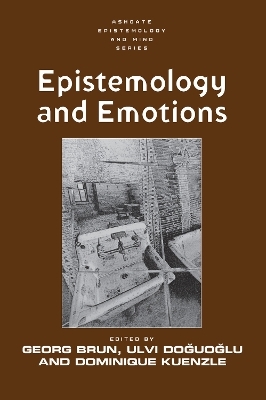
Epistemology and Emotions
Routledge (Verlag)
978-1-138-24580-8 (ISBN)
Dr Georg Brun, Senior Research Fellow, Environmental Philosophy Group, Institute for Environmental Decisions, ETH Zürich, Switzerland; Dr Ulvi Doguoglu, Senior Research Associate, University of Zürich, Switzerland and Dr Dominique Kuenzle, Research Assistant, Department of Philosophy, University of Zürich, Switzerland.
Introduction A New Role for Emotions in Epistemology?, Georg Brun, Dominique Kuenzle*We would like to thank Christoph Baumberger, Monika Betzler, Simone Dohle, Gertrude Hirsch Hadorn, Michael Roth and Alessandra Tanesini for helpful comments on earlier drafts.; Chapter One Emotion and Understanding, Catherine Z. Elgin*I am grateful to Amélie Rorty, Sabine Döring, and members of the University of Zürich Workshop on Epistemology and Emotions for comments on earlier drafts of this paper.; Chapter Two Epistemic Immediacy, Doubt and Anxiety: On a Role for Affective States in Epistemic Evaluation, Christopher Hookway; Chapter Three Virtues, Emotions and Fallibilism, Alessandra Tanesini*An earlier version of this paper was presented to the Philosophy Department at the University of Hull. I would like to thank Richard Gray, Michael Durrant, the editors of this volume and the audience in Hull for several very useful comments and queries.; Chapter Four Conflict Without Contradiction, Sabine A. Döring; Chapter Five Epistemic Immediacy and Reflection, Daniel Dohrn; Chapter Six Critical Reflections on Affective Epistemology, Markus Wild*Earlier versions of the paper were presented at the University of Zürich and the Humboldt University of Berlin. Many thanks to Simone Ungerer, Anik Waldow, Christopher Hookway, Martin Lenz, Dominik Perler, Alexander Staudacher, and Ulvi Do?uo?lu for discussion and criticism.; Chapter Seven Misleading Emotions, Peter Goldie; Chapter Eight How Cognition Meets Emotion: Beliefs, Desires and Feelings as Neural Activity, Paul Thagard*I am grateful to Ulvi Do?uo?lu and Benoit Hardy-Vallée for comments on an earlier draft. The Natural Sciences and Engineering Research Council of Canada provided research support.; Chapter Nine Epistemic Feelings, Ronald de Sousa*This paper has benefited as a result of many judicious comments by the editors, for which I am most grateful.;
| Erscheinungsdatum | 07.09.2016 |
|---|---|
| Verlagsort | London |
| Sprache | englisch |
| Maße | 156 x 234 mm |
| Gewicht | 453 g |
| Themenwelt | Geisteswissenschaften ► Geschichte |
| Geisteswissenschaften ► Philosophie ► Erkenntnistheorie / Wissenschaftstheorie | |
| ISBN-10 | 1-138-24580-1 / 1138245801 |
| ISBN-13 | 978-1-138-24580-8 / 9781138245808 |
| Zustand | Neuware |
| Haben Sie eine Frage zum Produkt? |
aus dem Bereich


